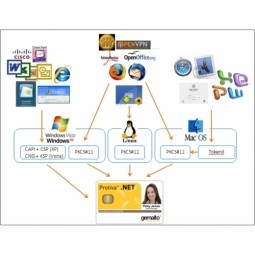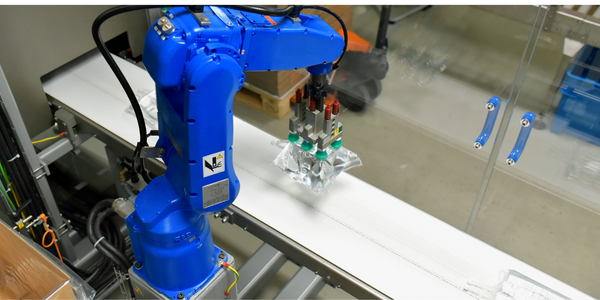Download PDF
Altair PBS Professional™ at the Translational Genomics Research Institute (TGen): Accelerating Genomic Discoveries
Technology Category
- Infrastructure as a Service (IaaS) - Cloud Computing
- Processors & Edge Intelligence - Embedded Operating Systems
Applicable Industries
- Life Sciences
Applicable Functions
- Maintenance
- Product Research & Development
Use Cases
- Onsite Human Safety Management
- Time Sensitive Networking
Services
- System Integration
The Challenge
The Translational Genomics Research Institute (TGen) was in need of a vendor-supported solution that could provide flexible job scheduling on Saguaro, their 512-node production cluster. TGen's mission is to translate knowledge of the human genome into therapeutics and diagnostics, a task that requires massive computational resources. The institute had established its High Performance Biocomputing Center (HPBC) to provide these resources, but they needed a solution that could handle the scheduling of large jobs across multiple nodes while also running thousands of small serial jobs on a single node. The solution also needed to be easy to install and require little to no support.
About The Customer
The Translational Genomics Research Institute (TGen) is a non-profit organization founded by a joint effort between the State of Arizona, Arizona State Municipal Governments, Indian Tribal Community, educational institutions, private foundations, and corporate entities. TGen's mission is to translate knowledge of the human genome into therapeutics and diagnostics. To achieve this, TGen has established its High Performance Biocomputing Center (HPBC) to provide the computational resources needed to discover how genetic changes contribute to disease progression and resistance to therapy. TGen serves about 65 accounts on Saguaro, most of them within TGen, but also includes scientific collaborators at Arizona State University and other research institutions.
The Solution
TGen chose Altair's PBS Professional for its flexibility and ease of installation. PBS Professional was able to meet TGen's needs by providing the ability to run large jobs across multiple nodes while also running thousands of small serial jobs on a single node. The software was easy to install and required little to no support, making it an ideal solution for TGen. PBS Professional also provided accounting capabilities, allowing TGen to track the number of jobs run and the amount of time each job takes. Looking ahead, TGen plans to upgrade to a newer version of PBS Professional, which offers features such as job array, redundancy, and failover. These features will help TGen handle the increased demand for Saguaro's resources.
Operational Impact
Quantitative Benefit
Related Case Studies.

Case Study
Corporate Identity Solution Adds Convenience to Beckman Coulter
Beckman Coulter wanted to implement a single factor solution for physical and remote logical access to corporate network. Bechman Coulter's users were carrying smart card badges for doors, but also needed a one-time password token to access to our corporate network when they were not in the office. They wanted to simplify the process.

Case Study
Embracing Business Success in Real Time
· Increase control over growing Big Data to improve business decisions · Manage data for 28,000 biotechnology stockkeeping units in the fields of microbiology, molecular biology, animal cell cultures, plant tissue cultures, and lab ware for laboratory chemicals · Accelerate report generation and analysis with real-time data

Case Study
Flow Robotics: Scaling Up Production and Accelerating Product Development with IoT
Flow Robotics, a Danish manufacturer, developed flowbot™ ONE pipetting robots to alleviate the strain on bioanalysts in life-science laboratories and hospitals across Europe. These robots were designed to automate part of the testing process, speeding up the time it takes to produce results and reducing pressure on staff. However, the company faced challenges in scaling up production and accelerating product development. High workloads and physically challenging conditions have long been an issue for laboratory professionals. Flow Robotics estimates that around half of medical lab technicians carry out the same arm movements for at least a quarter of their working day. The American Society for Clinical Pathology reported that 85% of laboratory professionals feel burnt out; 36% struggle with inadequate staffing; and 32% face a heavy workload and pressure to complete all testing on time.

Case Study
Revolutionizing Aerospace Industry with 3D Printing: A 63% Lighter Titanium Part
GE Aviation, a renowned name in the aerospace industry, recognized the potential of 3D printing technology in transforming the sector. The primary challenge was to reduce the weight of the aerospace parts, which would directly impact the fuel costs. A lighter airplane would mean lower fuel consumption, leading to cost savings and a smaller carbon footprint. However, achieving this weight reduction without compromising the strength and functionality of the parts was a significant challenge. Traditional manufacturing methods were not able to provide the desired weight reduction while maintaining the required stiffness and strength of the parts. The challenge was to find a solution that could create strong, light, and functional aerospace parts.
Case Study
Material Intelligence at Ethicon: Sustaining Medical Device Manufacturability and Improving Patient Care
Ethicon, a world-class medical devices company, faced several challenges in its operations. The rapid selection of manufacturing materials compliant in global markets was critical to assure patients, practitioners, and purchasing organizations of the biocompatibility of their medical devices. Ensuring supply chain continuity and minimizing risks of obsolescence for medical devices due to regulatory changes were also crucial in meeting Ethicon’s ongoing commitment to maintaining patient care. Furthermore, the engineers at Ethicon were developing the next generation of medical devices and needed to access historical material data to accelerate new product development. The process of centralizing and digitalizing its materials information was a significant challenge that Ethicon needed to overcome.
Case Study
IWT's Transformation: Customizing with Efficiency in IoT
IWT, a company specializing in the design, manufacture, and installation of washing systems for the life sciences and pharmaceutical industries, faced a significant challenge in managing its wide product portfolio. The company manufactures 45 different models, 60% of which are customized to some degree. This high level of customization, combined with limited production quantities, necessitated a controlled process for managing the release of engineering changes. The goal was to achieve efficiency, reduce process time, and better coordinate production throughout the organization. The need for strict compliance in heavily regulated industries further complicated the situation. IWT's existing PLM journey with Dassault Systèmes’ SOLIDWORKS for 3D CAD and Enovia for managing CAD data and Bills of Materials (BOMs) was proving inadequate. The system had limited part classification, no workflow, and no tool to ensure data consistency. The management of non-CAD documents was also a challenge, with information often difficult to find and access.





